- Home
- Michelle Hodkin
The Evolution of Mara Dyer md-2 Page 3
The Evolution of Mara Dyer md-2 Read online
Page 3
I couldn’t speak. I didn’t know what to say.
“It was . . . hard growing up with her, sometimes. I think it’s what made me want to be a psychologist. I wanted to help . . .” My mother’s voice trailed off, and then she seemed to remember me sitting there. Why I was sitting there. Her face flushed with color.
“Oh, sweetheart—I didn’t mean to—to make her sound that way.” She was flustered. “She was a wonderful mother and an incredible person; she was artistic and creative and so much fun. And she always made sure I was happy. She cared so much. If they knew when she was younger what they know now, I think . . . it would have turned out differently.” She swallowed hard, then looked straight at me. “But she isn’t you. You’re not the same. I only said something because—because things like that can run in families, and I just want you to know that it’s nothing you did, and everything that happened—the asylum, all of it—it is not your fault. The best therapists are here, and you’re going to get the best help.”
“What if I get better?” I asked quietly.
Her eyes brimmed with tears. “You will get better. You will. And you’ll have a normal life. I swear to God,” she said, quietly, seriously, “you’ll have a normal life.”
I saw my opening. “Do you have to send me away?”
She bit her lower lip and inhaled. “It’s the last thing I want to do, baby. But I think, if you’re in a different environment for a little while, with people who really know about this stuff, I think it’ll be better for you.”
But I could tell by the tone of her voice, and the way it wavered, that she wasn’t decided. She wasn’t sure. Which meant that I still might be able to manipulate her into letting me come home.
But it wouldn’t happen during this conversation. I had work to do. And I couldn’t do it with her here.
I yawned, and blinked slowly.
“You’re exhausted,” she said, studying my face.
I nodded.
“You’ve had the week from hell. The year from hell.” She took my face in her hands. “We’re going to get through this. I promise.”
I smiled beatifically at her. “I know.”
She smoothed my hair back and then turned to leave.
“Mom?” I called out. “Will you tell Dr. West that I want to talk with her?”
She beamed. “Of course, honey. Take a nap, and I’ll let her know to stop by and check on you in a bit, okay?”
“Thanks.”
She paused between the chair and the door. She looked conflicted.
“What’s wrong?” I asked her.
“I just—” she started, then closed her eyes. She ran her hand over her mouth. “The police told us yesterday that you said Jude assaulted you before the building collapsed. I just wanted—” She took a deep breath. “Mara, is that true?”
It was true, of course. When we were alone together in the asylum, Jude kissed me. Then he kept kissing me, even though I told him to stop. He pressed me into the wall. Pushed me. Trapped me. Then I hit him, and he hit me back.
“Oh, Mara,” my mother whispered.
The truth must have been evident on my face because before I decided how to answer her, she rushed back to me. “No wonder this has been even harder—the dual trauma, you must have felt so—I can’t even—”
“It’s okay, Mom,” I said, looking up at her with glassy, full eyes.
“No, it isn’t. But it will be.” She leaned down to kiss me again and then left the room, flashing a sad smile before she disappeared.
I sat up straight. Dr. West would be back soon, and I needed to get it together.
I needed to convince her—them—that I only had PTSD, and not that I was dangerously close to having schizophrenia or something equally scary and permanent. Because with PTSD, I could stay with my family and figure out what was going on. Figure out what to do about Jude.
But with anything else—this was it for me. A lifetime of psych wards and medication. No college. No life.
I tried to remember what my mother had said about my grandmother’s symptoms:
Suspicion.
Paranoia.
Magical thinking.
Delusions.
Nightmares.
Suicide.
And then thought about what I knew about PTSD:
Hallucinations.
Nightmares.
Memory loss.
Flashbacks.
There were similarities and there was overlap, but the main difference seemed to be that with PTSD, you know, rationally, that what you’re seeing isn’t real. Anything with a schizo prefix meant, however, that when you hallucinate, you believe it—even after the hallucination passes. Which makes it a delusion.
I did legitimately have PTSD; I experienced more than my share of trauma and now sometimes saw things that weren’t real. But I knew those things weren’t happening, no matter how much it felt like they were.
So now, I just had to be clear—very clear—that I didn’t believe Jude was alive either.
Even though he was.
6
THE CLOCKS IN THE PSYCHIATRIC UNIT TICKED away, counting down the hours that remained of my required seventy-two. It was going well, I thought on Day Three. I was calm. Friendly. Painfully normal. And when another psychiatrist named Dr. Kells introduced herself as the head of some program somewhere in Florida—I answered her questions the way she expected me to:
“Have you been having trouble sleeping?”
Yes.
“Have you been having nightmares?”
Yes.
“Do you have a hard time concentrating?”
Sometimes.
“Do you find yourself losing your temper?”
Every now and then. I’m a normal teenager, after all.
“Have you been experiencing obsessive thoughts about your traumatic experience?”
Definitely.
“Do you have any phobias?”
Doesn’t everyone?
“Do you ever see or hear people that aren’t there?”
Sometimes I see my friends—but I know they aren’t real.
“Do you ever think about harming yourself or others?
Once. But I would never do anything like that.
Then she left and I was offered lunch. I wasn’t particularly hungry but thought it would be a good idea to eat anyway. All part of the show.
The day dragged on, and near the end of it Dr. West returned. I sat at a table in the common area, as plain and impersonal as any hospital waiting room but with the addition of small round tables peppered with chairs. Two kids who looked to be around Joseph’s age were playing checkers. I was drawing on construction paper with crayons. It wasn’t my proudest moment.
“Hi, Mara,” Dr. West said, leaning over to see my picture.
“Hi, Dr. West,” I said. I smiled big and put down my crayon, just for her.
“How are you feeling?”
“Kind of nervous,” I said sheepishly. “I really miss being home.” I nudged the picture I was drawing just slightly—a flowering tree. She would read something into it—therapists read something into everything—and normal people love trees.
She nodded. “I understand.”
I widened my eyes. “Do you think I’ll get to go home?”
“Of course, Mara.”
“Today, I mean.”
“Oh. Well.” Her brow furrowed. “I don’t know yet, to be honest.”
“Is it even possible?” My innocent-kid voice was driving me insane. I’d used it more in the past day than I had in the past five years.
“Well, there are a few possibilities,” she said. “You could stay here for further treatment, or possibly transfer to another inpatient facility. Or your parents could decide that a residential treatment center would be the best place for you, since you’re a teenager—most of them have secondary educational programs that would allow you to spend some time on coursework as you’re working in group and experiential therapies.”
&nb
sp; Residential. Not ideal.
“Or an outpatient program could be the best thing—”
“Outpatient?” Tell me more.
“There are day programs for teens who are going through difficult things, just like you.”
Doubtful.
“You work mostly with counselors and your peers in group therapy and in experiential therapies like art and music—with a bit of time devoted to schoolwork, but the focus is definitely on therapy. And at the end of the day, you go home.”
Not so terrible. At least now I knew what to hope for.
“Or, your parents might decide not to do anything but therapy. We’ll make our recommendation, but ultimately, it’s up to them. Your mother should be stopping by soon, actually,” she said, glancing at the elevators. “Why don’t you keep drawing—what a lovely picture!—and then we’ll speak again after I talk with her?”
I nodded and smiled. Smiling was important.
Dr. West left, then, and I was still attempting to make the falsely cheerful picture even more falsely cheerful when I was startled by a tap on my shoulder.
I half-turned in the plastic chair. A young girl, maybe ten or eleven, with long, unbrushed dirty blond hair stood shyly with her thumb in her mouth. She wore a white T-shirt that was too big for her over a blue skirt with ruffles to match her blue socks. She passed me a folded piece of paper with her free hand.
Sketchbook paper. My fingers identified the texture immediately, and my heartbeat quickened as I unfolded it, revealing the picture I gave Noah, of Noah, weeks ago at Croyden. And on the back were just three words, but they were the most beautiful words in the English language:
I believe you.
They were written in Noah’s handwriting, and my heart turned over as I looked behind me, hoping by some miracle to see his face.
But there was no one here that didn’t belong.
“Where did you get this?” I asked the girl.
She looked down at the linoleum floor and blushed. “The pretty boy gave it to me.”
A smile formed on my lips. “Where is he?”
She pointed down the hallway. I stood, leaving the bullshit tree and my sketch on the table, and looked around calmly even though I wanted to run. One of the therapists sat at a table talking to a boy that kept scratching himself, and one of the staff members manned the front desk. Nothing out of the ordinary, but obviously, something was. I casually walked toward the restrooms—they were close to the hallway, which was close to the elevators. If Noah was here, he couldn’t be far.
And just before I turned the corner, I felt a hand gently grab my wrist and pull me into the girls’ bathroom. I knew it was him even before I saw that face.
I lingered on the blue-gray eyes that studied mine, on the small crease between them above the line of his elegant nose. My eyes wandered over the shape of his mouth, following its curve and pout, as if he was just about to speak. And that hair—I wanted to jump into his arms and run my fingers through that hair. I wanted to crush my mouth against those lips.
But Noah placed a long finger on mine before I could say a word. “We don’t have much time.”
His nearness filled me with warmth. I couldn’t believe he was really here. I wanted to feel him more, just to make sure he really was.
I raised a tentative hand to his narrow waist then. His lean muscles were taut, tense beneath the thin, soft cotton of his vintage T-shirt.
But he didn’t stop me.
I couldn’t stop my smile. “What is it with you and girls’ bathrooms?” I asked, watching his eyes.
The corner of his mouth lifted. “That is a fair question. In my defense, they’re much cleaner than boys’ bathrooms, and they do seem to be everywhere.”
He sounded amused. Arrogant. That was the voice I needed to hear. Maybe I shouldn’t have worried. Maybe we were okay.
“Daniel told me what happened,” Noah said then. His tone had changed.
I met his eyes and saw that he knew. He knew what happened to me, why I was here. He knew what my family thought.
I felt a rush of heat beneath my skin—from his gaze or from shame, I didn’t know. “Did he tell you what I—what I said?”
Noah stared down at me through the long dark lashes that framed his eyes. “Yes.”
“Jude’s here,” I said.
Noah’s voice wasn’t loud but it was strong when he spoke. “I believe you.”
I didn’t know how badly I needed to hear those words until he said them out loud. “I can’t stay here while he’s out there—”
“I’m working on that.” Noah glanced at the door.
I knew he couldn’t stay, but I didn’t want him to leave. “Me too. I think—I think there’s a chance my parents might let me come home,” I said, trying not to sound as nervous as I felt. “But what if they make me stay? To keep me safe?”
“I wouldn’t, if I were them.”
“What do you mean?”
“Any minute now . . .”
Two seconds later, the sound of an alarm filled my ears.
“What did you do?” I said over the noise as he backed up toward the bathroom door.
“The girl who gave you the note?”
“Yes . . .”
“I caught her staring at my lighter.”
I blinked. “You gave a child, in a psych ward, a lighter.”
His eyes crinkled at the corners. “She seemed trustworthy.”
“You’re sick,” I said, but smiled.
“Nobody’s perfect.” Noah smiled back.
7
NOAH’S PLAN WORKED. THE GIRL WAS CAUGHT setting fire to my drawing, actually, but not before the alarm went off. They managed to override a full-scale evacuation and in the midst of the chaos, Noah slipped out. Just before my mother arrived. And she wasn’t happy.
“I can’t believe someone on staff would bring a lighter in here.” Her voice was acid.
“I know,” I said, sounding worried. “And I was working really hard on that picture.” I shuddered for effect.
My mother rubbed her forehead. “Dr. West thought you should stay here for another week, to get your medications stabilized. She also thought you’d be a good candidate for an inpatient program, it’s called Horizons—”
My stomach dropped.
“It’s off of No Name Key, and I’ve seen the pictures—it’s really beautiful and has an excellent reputation, even though they’ve only been operating for about a year. Dr. Kells, the woman who runs it, said she met you and that you’d fit in really well—but I just . . .” She sucked in her lower lip, then sighed. “I want you home.”
I could have cried, I was so relieved. Instead I said, “I want to come home, Mom.”
She hugged me. “Your father’s been discharged and he’s waiting downstairs—he can’t wait to see you.”
My heart leapt. I couldn’t wait to see him.
“Should we get your stuff?”
I nodded, my eyes appropriately misty. I didn’t have much with me, so I mostly milled around while my mother filled out a bunch of paperwork. One of the psychiatrists—Dr. Kells—clicked toward me in expensive-looking heels. She was dressed like my mother—silk blouse, pencil skirt, perfectly applied makeup and perfectly coiffed hair.
Her wide red lips pulled back to reveal a flawless smile. “I hear you’re going home,” she said.
“Looks that way,” I said back, careful not to sound too smug.
“Good luck to you, Mara.”
“Thanks.”
But then she didn’t leave. She just stood there, watching me.
Awkward.
“Ready?” Mom called out.
Just in time. I left Dr. Kells with a wave and met my mother by the elevator. As the doors closed, it took everything I had not to cheer.
“What do you think of her?” Mom asked me, once we were alone.
“Who?”
“Dr. Kells.”
I wondered where she was going with this. “She’s all right.”
/>
“There’s an outpatient program that Dr. West recommended—it’s actually run by her as part of Horizons. They do a lot of group therapy work—teens only—and art and music therapies, that type of thing.”
“Okay . . .”
“I think it would be good for you.”
I wasn’t sure what to say. Outpatient was better than inpatient, certainly—and I had to act like I wanted that brand of help. But dropping out of school was a big deal. I needed a minute to think.
Luckily, I got it. Because the elevator doors opened and there was my father standing in the lobby, looking healthy and invincible. I knew better than anyone that he wasn’t.
“Dad,” I said, with a smile so wide it hurt my cheeks. “You look good.” He really did; the pale skin we shared had some color to it, and he didn’t seem tired or haggard or thin, despite what he’d been through. In fact, standing there in khakis and a white polo shirt, he looked like he was heading out to play golf.
He flexed one of his arms and pointed at his biceps. “Man of steel.”
My mother shot him a withering look, and then the three of us walked out into the sub-Saharan humidity and into the car.
I was happy. So happy that I almost forgot what landed me in the hospital in the first place. What landed my father in the hospital in the first place.
“So what do you think?” my mother asked me.
“Hmm?”
“About the Horizons Outpatient Program?”
Had she been talking? Had I not noticed?
Either way, I was out of time. “I think—I think it sounds okay,” I finally said.
My mother let out a breath I hadn’t noticed she’d been holding. “Then we’ll make sure you start ASAP. We’re so happy you’re coming home, but there are going to be adjustments. . . .”
There’s always another shoe.
“I don’t want you home alone. And I don’t want you driving, either.”
I bit my tongue.
“You can leave the house as long as Daniel’s with you. And if you come back without him, he’ll have to answer for it.”
Which wasn’t fair to him. Which they knew.
“Someone will take you to and from the program every day—”

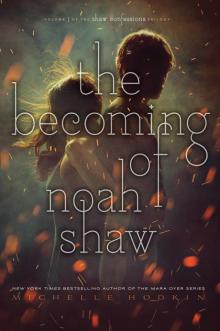 The Becoming of Noah Shaw
The Becoming of Noah Shaw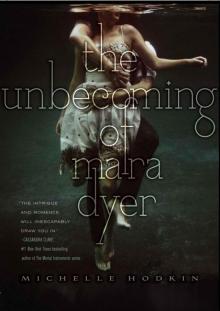 The Unbecoming of Mara Dyer
The Unbecoming of Mara Dyer The Retribution of Mara Dyer
The Retribution of Mara Dyer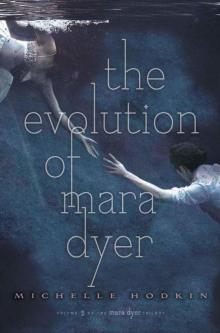 The Evolution of Mara Dyer
The Evolution of Mara Dyer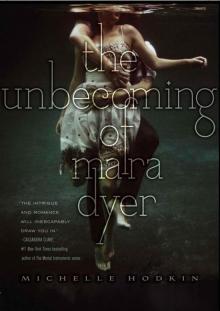 The Unbecoming of Mara Dyer md-1
The Unbecoming of Mara Dyer md-1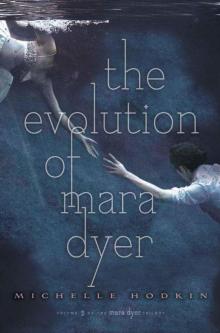 The Evolution of Mara Dyer md-2
The Evolution of Mara Dyer md-2 The Reckoning of Noah Shaw
The Reckoning of Noah Shaw